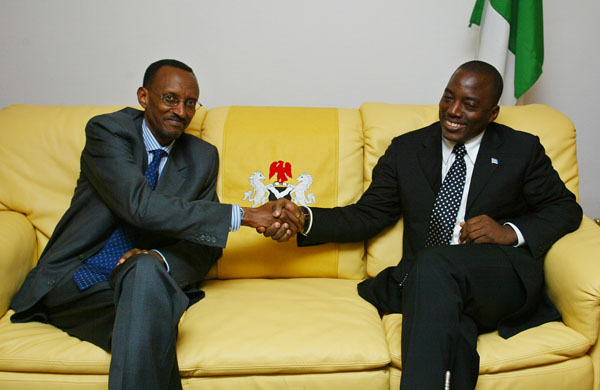
In light of mounting evidence of the Rwandan government’s support of Bosco Ntaganda and the rebellious M23 movement, the U.S. government must critically re-evaluate its military and development aid and foreign policy strategy vis-à-vis Kigali and urge further high-level investigations into the alleged incidents of Rwandan interference.
In a new Enough Project report, “Rwanda’s Long Shadow: U.S.-Rwandan Relations and a Path Forward in Eastern Congo” Associate Director of Research Aaron Hall highlights Rwanda’s long and troubled history with its larger neighbor to the west. The paper cites a lengthy pattern of involvement by Rwanda in Congolese affairs going back to the 1994 genocide and its disastrous—and ongoing—effects on eastern Congo.
Both Kinshasa and Kigali have traded accusations about undue meddling in each others’ internal affairs. Many influential Rwandans believe the East has become a safe haven for rebel forces wishing to overthrow the regime in Kigali, particularly the Rwandan Hutu-led Democratic Forces for the Liberation of Rwandan, or FLDR. This group, which crossed into Congo in 1994 amid a flood of Hutu refugees, includes some of those responsible for planning and perpetrating the Rwandan genocide. At the same time, many Congolese believe that Rwanda has manipulated Congolese politics and security for its own ends, particularly to continue to exploit Congolese land and natural resources and to carve out a Tutsi Rwandophone enclave with ties to Kigali.
Congolese civilians have suffered immensely due to two decades of political and military machinations, often orchestrated from Kigali, in the eastern region. Unfortunately, this latest rebellion is no different, and civilians are being displaced in massive numbers, as well as intentionally targeted by rebel forces. In fact, evidence from the United Nations Mission to Congo, or MONUSCO, Human Rights Watch, and Enough’s on the ground research has shown that Rwanda has been involved in the forcible recruitment of men and boys, who are then sent to fight with the M23 rebels in eastern Congo.
The U.S. government cannot stand idly by as Rwanda brazenly breaches Congo’s national sovereignty and wreaks havoc on innocent Congolese civilians. The U.S. government must hold Kigali to account for its destabilizing activities. As the report’s author noted:
Going forward it is clear that Rwanda will continue to negatively intervene in Congolese affairs to protect its own interests if action is not taken to dissuade Kigali from doing so. It the USG and other donor nations do not push for change, there is no reason to believe the Rwandan state would veer off its current course, which it believes can be carried out without repercussion.
The U.S. government should:
- Ensure that the recent investigation by the U.N. Group of Experts on Congo is published and leveraged as a step towards ending external intervention in eastern Congo.
- Push the U.N. Security Council to provide resources for the Group of Experts to continue an investigation into Rwandan involvement in the East.
- Begin a formal policy review of U.S. military and developmental aid to Rwanda, sending a clear signal that the U.S. government will not tolerate further meddling in eastern Congo.
- Partner with the Congolese government and the United Nations to develop and execute an aggressive strategy to dismantle the Rwandan Hutu militia, the FLDR, in the Congo, thus removing Rwanda’s purported reason for involvement in the East.
Read the full report: “Rwanda’s Long Shadow: U.S.-Rwandan Relations and a Path Forward in Eastern Congo”
Photo: Rwandan President Paul Kagame and Congolese President Joseph Kabila (AP)

